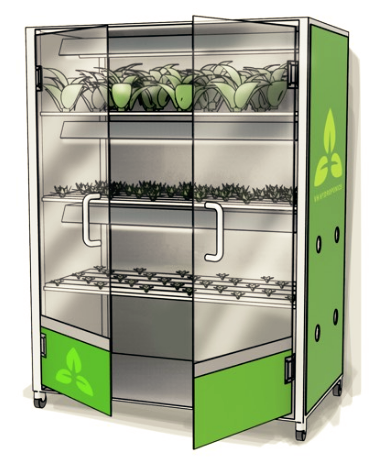VH Hydroponics Pilots New Line of Hydroponic Growing Cabinets in Student Union
VH Hydroponics Pilots New Line of Hydroponic Growing Cabinets in Student Union
February 21, 2018
A demo unit of Vertical Harvest Hydroponics’ new indoor gardening cabinets is located in UAA’s Student Union. The university is one of only two places that the hydroponic growing cabinets are located in Anchorage, along with the Anchorage Museum.
VH Hydroponics is an agricultural technology company headquartered in Anchorage. The company, founded in 2014, has a mission to “provide an alternate way to source fresh, locally grown and sustainable produce in remote communities, year-round,” as stated on their website.
Hydroponics is the process of growing plants in a nutrient dissolved solution rather than in soil. This method offers many advantages, notably location flexibility and ability to produce crops year round. Other pros include no weather dependency, little to no bugs or weeds, less water consumption than typical farms and the ability to grow a large variety of crops.
The idea for installing a hydroponic cabinet in the university was presented by a group of students to the Green Fee Board. Many other hydroponic-based proposals have been brought to the board in the past, but according to Heather Jesse, chair for the Green Fee Board, this idea rose above the rest.
“Hydroponics is one of the most popular student ideas and one that is frequently presented to the board via grant proposals,” Jesse said. “This was the most feasible hydroponics proposal we’ve ever received, financially and physically. We were more than happy to fund it.”
After the efforts of the Green Fee Board, partnered with Student Activities and Commuter Programs, the hydroponic cabinet is now up and running in the Student Union. It is currently growing chard, kale, lettuce, chamomile, mint and strawberries.
Produce grown in the cabinet will help support the Daily Den. The program offers free food and beverages to students twice a day, Monday through Thursday. Vegetables produced in the cabinet will be introduced into the meals made at the Daily Den.
Jesse found the decision to install the cabinet extremely beneficial to students who take advantage of the Daily Den. She also believes it is a good use of the Green Fee, a $3 fee collected from every UAA student taking at least three credits on campus.
“As a student who frequently eats at the Daily Den, I think the benefits are very clear. Almost all of the meals I’ve had there have been carbs, frozen or both,” Jesse said. “Being able to provide students with proper nutrition, fresh vegetables and fruit is a priceless opportunity, especially since the Daily Den serves so many students each year.”
The growing cabinets are a new and smaller alternative to VH Hydroponics’ main product, the Containerized Growing System. These 40-foot units function relatively the same as the cabinets, although much larger. They are used in grocery stores, restaurants and hospitals.
Joe Selmont, a member of the Green Fee Board, sees the current cabinet system as an investment that could continue to grow in the future.
“In the long term, our little experiment with hydroponics holds potential to inspire confidence for the university to purchase a larger system that could eventually make us more self-sufficient, while simultaneously providing much needed nourishment to food-insecure students,” Selmont said.
If the cabinet proves successful, Kojin Tranberg, Commuter Programs coordinator within the Student Life and Leadership office, hopes to invest in one of the larger, commercial hydroponic units. This investment would also involve the organization’s campus partners, Seawolf Dining and the UAA Culinary Arts program.
One of Tranberg’s main focuses is food insecurity on-campus. This topic is one of the motivations behind the installation of the hydroponic cabinet. Tranberg believes the new growing unit will initiate student conversations about the topic.
“I personally have the ambition to stamp out hunger on campus,” Tranberg said. “This hydroponic garden is a key part in bringing awareness to the issue of food insecurity.”



